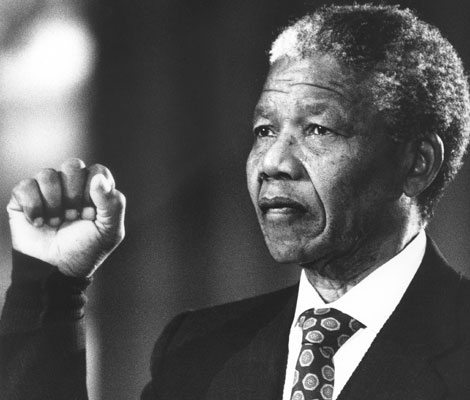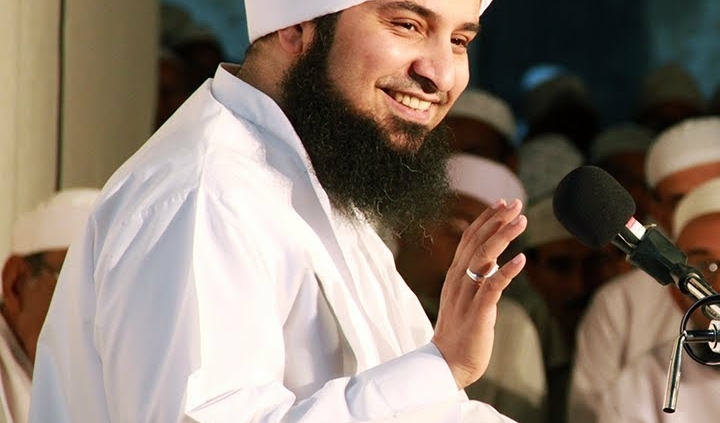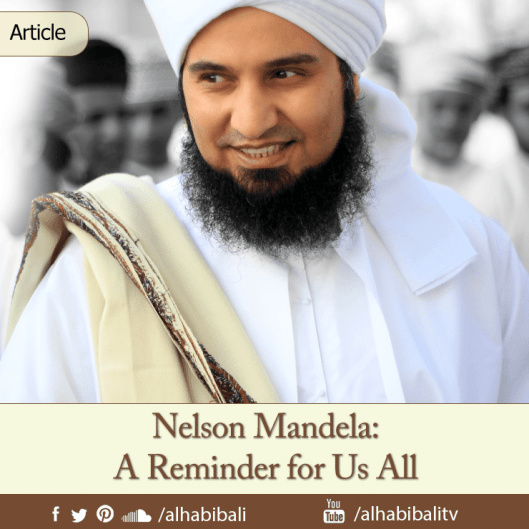Nelson Mandela: A Reminder for Us All – Habib Ali Al-Jifri
Original article can be found here.
Of the many principles that Nelson Mandela stood for, his struggle against the apartheid regime was one, but it was not this that made him unique. In fact, Imam Abdullah Haron preceded him in this struggle in South Africa and died in prison after being tortured by the apartheid regime.
One of the things Mandela taught his people and the modern world was how the victor should forgive and pardon those who wronged and oppressed him. He showed how a leader can help his people surpass the difficulty of the past to build a common future.
Meanwhile, we as Muslims have forgotten the words of the Prophet, upon him be peace, to the disbelievers of Quraysh who had tormented him and his companions. He said to them when they were completely at his mercy: “Go forth, for you are free.” This was then a cause for them to enter Islam and take part in spreading the lofty values of the religion throughout the world.
Another great principle that Mandela stood for was global humanitarianism. He was not merely concerned with his own people. Rather, he experienced the pain of oppressed people throughout the world regardless of their race, colour, nationality or religion. He supported the Palestinian cause in the international community. He likened the struggle of the Palestinian people to the freedom struggle of black South Africans. The Elders organisation which he brought together issued a statement condemning the blockade of the Gaza Strip. Mandela described the attack on the ‘peace ship’ carrying aid to Gaza as completely inexcusable. He worked to resolve the conflict in Burundi which had led to a vast number of deaths and succeeded in bringing conflicting groups to an agreement. He vehemently opposed the American occupation of Iraq and lambasted U.S. President George W. Bush for his decision, even though in the same year the latter had awarded him the U.S. Presidential Medal of Freedom. He accused Bush of “desiring to plunge the world into a new holocaust” and said that all that Bush wanted from Iraq was its oil. He said that the U.S. had committed more “unspeakable atrocities” across the world than any other nation, citing the atomic bombing of Japan.
Meanwhile, we have forgotten that the Prophet stood up when the funeral procession of a Jewish man passed. When they asked him why he was standing for a Jewish man, he replied: “Is it not a human soul?” We have also forgotten that he commended the ‘Alliance of the Virtuous’ (Ḥilf al-Fuḍūl), a pre-Islamic pact made to support the oppressed. He said that if he was invited to make a similar pact again he would do so.

We have forgotten that the Prophet refused to consider people wronging us as a justification for showing aggression towards other people of the same race or religion. He did not use the treachery of the Jewish tribes of Banū Qaynuqā` and Banū al-Naḍīr and the Jews of Khaybar as a justification for showing aggression to every Jew living in al-Madīnah. In fact when he died his shield was pawned to a Jewish man in exchange for some food which he had bought from him. Neither did the Prophet refuse to have dealings with the man and nor did he regard it lawful to take the man’s property just because his co-religionists had wronged and betrayed Muslims.
Mandela realised that hatred and racism had been the cause of his 27-year imprisonment. He thus decided to make racism the enemy and not the people who had the misfortune of believing in and spreading racist beliefs. In other words, he declared war on the illness itself and not on those suffering from the illness. He said: “When I was released from prison I realised that if I did not leave my hatred behind me I would remain imprisoned.” He also said: “I knew that people expected me to harbour bitterness towards white people, but I had no hatred for them whatsoever. The hatred that I had for them gradually disappeared during my time in prison, but my hatred for the regime increased. I wanted the people of South Africa to know that I love even my enemies, while I hate the regime that created this enmity between us.”
We have forgotten that the Prophet warned us against hatred and called it ‘the disease of nations.’ He said: “The disease of previous nations has crept up upon you: envy and hatred. Truly, hatred is a razor: it shaves away not a person’s hair, but their religion.” Likewise we have forgotten the Prophet’s words: “Honour those who sever ties with you, give to those who withhold from giving to you, and pardon those who wrong you.”
Mandela realised the importance of having a sound heart, and that a person’s intellect alone is not capable of managing the affairs of this life if their heart is corrupt. In fact, if a person’s heart is corrupt, their intellect then becomes a cause of corruption on the earth. He said: “A sound intellect and a sound heart are always a great combination.”
We have forgotten that the Prophet said: “In the body is a lump of flesh. If it is sound, the whole body is sound and if it is corrupt the whole body is corrupt. It is the heart.”
The first house that Mandela entered after spending 27 years in prison was the house of his Muslim friend, Dullah Omar. Dullah Omar was Mandela’s comrade in the struggle and as a lawyer he advised and represented him. The fact that Mandela had attained fame and victory did not cause him to show arrogance to others based upon false religiosity.
We have forgotten that after his victory at the Battle of Badr, our the Prophet remembered Muṭ`im bin`Adī, a man who had not become Muslim but who had protected him from the nonbelievers on his return from al-Ṭā’if to Makkah. The Prophet said that had Muṭ`im still been alive and had he interceded with him on behalf of the nonbelievers who had been taken prisoner at Badr, he would have honoured him by setting them free. We have also forgotten that the Prophet’s poet, Ḥassān bin Thābit, wrote a poem eulogizing Muṭ`im upon his death.
Mandela fought against those who fought, killed, oppressed and racially discriminated against his people. He took the path of armed struggle when he was forced to do so. However, he did not make killing and bloodshed his methodology. He said clearly after his release from prison: “As long as apartheid is the case, the armed struggle will go on.” As soon as the regime accepted peaceful negotiations, he promised that fighting would stop. When this happened, he kept to his promise. He suppressed the inclination to take revenge and strongly spoke out against violence, saying: “If violence is not firmly and decisively rejected then any hope in progressing towards a new political system with remain shaky.”
We have forgotten that our Prophet rushed to accept the Treaty of al-Ḥudaybiyah, in spite of the unjust conditions contained in it. He accepted these conditions because he knew that if his adversaries from the Meccan Quraysh tribe honoured the treaty, the phase of violent conflict would end and a new phase would begin in which he would be able to peacefully call people to Islam. He firmly defended his position when some of his companions refused to accept the treaty.
We have also forgotten that our Prophet pardoned many of Islam’s most bitter and violent opponents. He had ordered for the worst of them to be put to death even if they sought amnesty by clinging on to the Kabah. However, as soon as he had taken Makkah and these individuals no longer had the opportunity to engage in bloodshed, he pardoned them. Ikrima, the son of Abū Jahl, was among those the Prophet pardoned. When he came to the Prophet wishing to enter Islam, the Prophet welcomed him. Furthermore, he forbade the Muslims from mentioning anything unpleasant about his father so as not to hurt his feelings. This was in spite of the fact that this father, Abū Jahl, was the most vehement of the Prophet’s enemies and the person who played the greatest role in spurring hostilities against the Muslims.
It was due to the aforementioned principles and others that the world respected Mandela and was affected by his life and death. Through embodying these values we can have a true role in benefitting the whole of mankind. Through them we can attain the pleasure of God and be a source of joy for His Prophet. Without these values we will have no value in this life and nor attain a high station in the next life. In closing, let us recall the words God says to His Prophet: “Yours is indeed a tremendous character.”
A shorter version of this article appeared in The National on 12 December.

